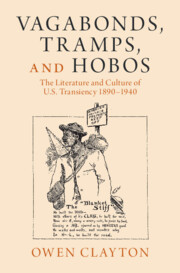Book contents
- Vagabonds, Tramps, and Hobos
- Cambridge Studies in American Literature and Culture
- Vagabonds, Tramps, and Hobos
- Copyright page
- Dedication
- Contents
- Figures
- Acknowledgements
- Part I Context
- Part II The Vagabond and the Tramp
- 2 In Search of Experience: Vagabond Travel Narratives
- 3 Vulnerable Youth and Hobosexuality in the Works of Jack London and A-No.1
- 4 ‘That’s Why the Lady Is a Tramp’: The Hidden Story of Female Transiency
- Part III The Hobo Transformed
- Conclusion: The End of the Road? Transiency beyond the Hobo
- Notes
- Bibliography
- Index
- Recent books in this series (continued from page ii)
4 - ‘That’s Why the Lady Is a Tramp’: The Hidden Story of Female Transiency
from Part II - The Vagabond and the Tramp
Published online by Cambridge University Press: 27 July 2023
- Vagabonds, Tramps, and Hobos
- Cambridge Studies in American Literature and Culture
- Vagabonds, Tramps, and Hobos
- Copyright page
- Dedication
- Contents
- Figures
- Acknowledgements
- Part I Context
- Part II The Vagabond and the Tramp
- 2 In Search of Experience: Vagabond Travel Narratives
- 3 Vulnerable Youth and Hobosexuality in the Works of Jack London and A-No.1
- 4 ‘That’s Why the Lady Is a Tramp’: The Hidden Story of Female Transiency
- Part III The Hobo Transformed
- Conclusion: The End of the Road? Transiency beyond the Hobo
- Notes
- Bibliography
- Index
- Recent books in this series (continued from page ii)
Summary
Chapter Four examines accounts of female transiency from the early twentieth century. Analysing writings by and about Dolly Kennedy Yancy, Agnes Thecla Fair, Kittie Solomon and Barbara Starke (whose real name was Helen Card), the chapter argues that female transient writing provides a different focus to representations of transient women written by men. When they do write about women, male writers obsess about sex: presenting the road as a place of moral danger or a space of fantastical sexual liberation. Female authors, on the other hand, treat sex as merely one aspect, and often an annoying one, of the transient experience. Yancy, Fair, Solomon and Starke focus on the liberatory aspects of moving beyond domestic confinement that transiency can offer to women in the early twentieth century. Yancy and Solomon discuss sex rarely. Fair and Starke both discuss incidents of sexual assault or harassment. Stake in particular represents male sexual harassment as a constant background noise to the female transient experience.
Keywords
- Type
- Chapter
- Information
- Vagabonds, Tramps, and HobosThe Literature and Culture of U.S. Transiency 1890–1940, pp. 107 - 136Publisher: Cambridge University PressPrint publication year: 2023

